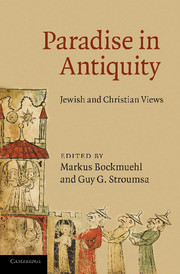Book contents
- Frontmatter
- Contents
- Notes on contributors
- 1 Introduction: the paradise chronotrope
- PART I PARADISES OF SECOND TEMPLE JUDAISM AND CHRISTIAN ORIGINS
- 2 The messiah in the garden: John 19.38–41, (royal) gardens, and messianic concepts
- 3 Philo's scholarly inquiries into the story of paradise
- 4 Paradise in the Biblical Antiquities of Pseudo-Philo
- 5 Paradise, gardens, and the afterlife in the first century ce
- 6 Paradise in the New Testament
- 7 Quis et unde? Heavenly obstacles in Gos. Thom. 50 and related literature
- PART II CONTEMPORIZING PARADISE IN LATE ANTIQUITY
- 15 Epilogue: a heaven on earth
- Select bibliography
- Index of subjects
- Index of authors (cited in text)
- Index of sources
3 - Philo's scholarly inquiries into the story of paradise
Published online by Cambridge University Press: 06 December 2010
- Frontmatter
- Contents
- Notes on contributors
- 1 Introduction: the paradise chronotrope
- PART I PARADISES OF SECOND TEMPLE JUDAISM AND CHRISTIAN ORIGINS
- 2 The messiah in the garden: John 19.38–41, (royal) gardens, and messianic concepts
- 3 Philo's scholarly inquiries into the story of paradise
- 4 Paradise in the Biblical Antiquities of Pseudo-Philo
- 5 Paradise, gardens, and the afterlife in the first century ce
- 6 Paradise in the New Testament
- 7 Quis et unde? Heavenly obstacles in Gos. Thom. 50 and related literature
- PART II CONTEMPORIZING PARADISE IN LATE ANTIQUITY
- 15 Epilogue: a heaven on earth
- Select bibliography
- Index of subjects
- Index of authors (cited in text)
- Index of sources
Summary
Philo is our earliest extant witness to an exegetical interest in paradise among Alexandrian Jews. While no fragment of Demetrius' questions has survived on this topic and neither Aristeas, Artapanus nor Ezekiel the Tragedian were interested in it, Philo provides evidence of a lively discussion in the first century ce. These discussions relate to specific motifs in the story of paradise, but reflect a more fundamental controversy about reading strategies of Scripture. Were scholarly methods to be applied or not? Was the idea of myth in Scripture acceptable or should the text rather be interpreted allegorically?
In these distinctly hermeneutical matters Alexandrian Jews went their own distinct way, often using surprisingly modern methods of scholarship and anticipating their brethren in the Land of Israel for several centuries. The author of the Book of Jubilees, who is the first to expand on the story of paradise in the Land of Israel, paraphrases the biblical story, adding significant material only on the issue of Shabbat observance. 1 Enoch 32.3 and the Testament of Levi 18.10, the dates of which are very uncertain, introduce apocalyptic and eschatological perspectives, which are also developed in the New Testament (Luke 23.43, Rev. 2.7). In these works the biblical text is not in itself an object of inquiry, but rather serves symbolical functions in an overall religious framework. Indeed, it is only rabbinic midrash Genesis Rabbah, redacted probably in the early fifth century, which shows a similarly scholarly approach with attention to each verse.
- Type
- Chapter
- Information
- Paradise in AntiquityJewish and Christian Views, pp. 28 - 42Publisher: Cambridge University PressPrint publication year: 2010



